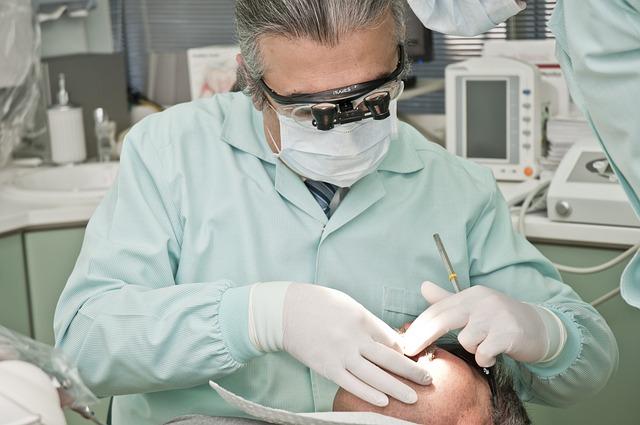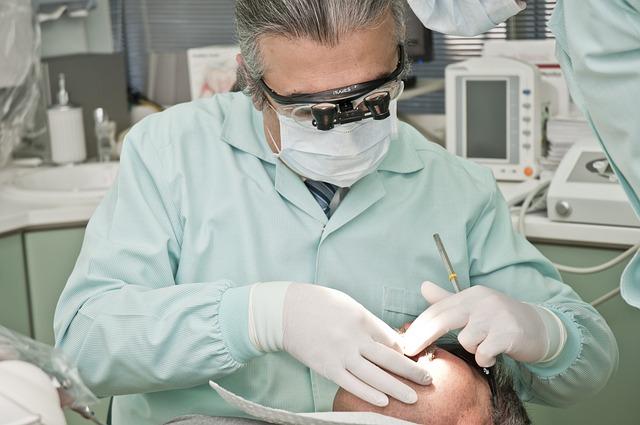Should You Gargle Saltwater After Tooth Extraction? Dental Recommendations
Have you recently undergone a tooth extraction? If so, you may be wondering about the best ways to promote healing and prevent infection in your mouth. One age-old remedy that often comes up in discussions about post-extraction care is gargling saltwater. But does this simple solution actually live up to the hype? In this article, we will delve into the dental recommendations surrounding the practice of gargling saltwater after tooth extraction. Armed with expert knowledge, we aim to provide you with a clear and confident answer to this common question. So, let’s set the record straight and shed some light on whether or not gargling saltwater is truly beneficial for your healing process.
1. Understanding the Benefits and Drawbacks of Gargling Saltwater after Tooth Extraction
Gargling saltwater after a tooth extraction can provide several benefits as well as some drawbacks to consider. It is important to understand both aspects before deciding whether this practice is suitable for you.
Benefits of Gargling Saltwater:
1. Reduces swelling and inflammation: Saltwater gargles can help in reducing swelling and inflammation in the mouth, particularly after a tooth extraction. The salt acts as a natural disinfectant and can help clean the wound, promoting faster healing.
2. Prevents infection: Saltwater has antimicrobial properties that can help prevent infections in the extraction site. Gargling with saltwater can create an environment that is less favorable for the growth of bacteria, reducing the risk of developing an infection.
3. Soothes discomfort: Gargling saltwater can provide temporary relief from discomfort and pain after a tooth extraction. It can help alleviate soreness and promote a soothing effect in the mouth.
Drawbacks of Gargling Saltwater:
1. Risk of overdoing it: While saltwater gargles can be beneficial, excessive rinsing can disrupt the natural healing process. It is important to follow the recommended frequency and duration provided by your dentist or oral surgeon.
2. May not be suitable for everyone: Some individuals may find saltwater gargles uncomfortable or may not tolerate the salty taste. Additionally, if you have certain medical conditions like high blood pressure or kidney problems, it is best to consult with your healthcare professional before trying this remedy.
3. Limited effectiveness: Although saltwater gargles can help with oral hygiene and wound healing, they may not address all post-extraction concerns such as severe pain or excessive bleeding. In such cases, it is crucial to seek advice from your dentist for appropriate treatment options.
Remember, it is always advisable to consult with your dentist or oral surgeon before incorporating any post-tooth extraction routine, including gargling saltwater, to ensure it aligns with your specific needs and circumstances.

2. Dental Experts Shed Light on the Pros and Cons of Saltwater Gargling Post Tooth Extraction
Saltwater gargling is a common practice recommended by dental experts for individuals who have recently undergone tooth extraction. This age-old remedy involves rinsing the mouth with a solution of warm water and salt. While it is believed to provide several benefits, it is important to weigh its pros and cons before incorporating it into your post-extraction routine.
Pros:
1. Reduces swelling and inflammation: Saltwater gargling has been found to help reduce swelling and inflammation in the gum tissues after a tooth extraction. The warm saline solution acts as a natural disinfectant, promoting faster healing and alleviating discomfort.
2. Cleanses the mouth: Gargling with saltwater can help remove debris and bacteria from the extraction site, preventing infection and promoting oral hygiene.
3. Soothes pain: The saltwater solution can provide temporary relief from post-extraction pain by numbing the area and reducing sensitivity.
Cons:
1. Risk of over-gargling: Excessive gargling with saltwater can actually delay the healing process by disrupting the blood clot formation in the extraction site. It is crucial to follow the recommended frequency and duration of gargling as advised by your dentist.
2. Taste and discomfort: Some individuals may find the taste of saltwater gargling unpleasant or experience discomfort while gargling, especially if the extraction site is still sensitive.
3. Limited effectiveness: While saltwater gargling can be beneficial in the initial stages of healing, its effectiveness may diminish as the extraction site progresses towards full recovery. At that point, other oral hygiene practices recommended by your dentist may be more suitable.
Keep in mind that saltwater gargling should always be done in addition to, not as a replacement for, other post-extraction care instructions provided by your dental professional. It is essential to consult your dentist for personalized advice and guidance tailored to your specific dental needs.
3. The Science Behind Gargling Saltwater: Dental Recommendations for Optimal Post-Extraction Care
After undergoing a tooth extraction, it is crucial to follow proper post-operative care to ensure a smooth and speedy recovery. One commonly recommended practice is gargling saltwater, which has been backed by scientific evidence for its effectiveness in promoting healing and reducing discomfort. Here’s why:
- Antibacterial properties: Saltwater (saline solution) acts as a natural disinfectant by killing bacteria in the mouth. Gargling with saltwater helps prevent infection and promotes a clean healing environment.
- Reduced inflammation: The osmotic effect of saltwater draws fluid away from the surgical site, reducing swelling and inflammation. This can alleviate pain and speed up the healing process.
- Enhanced blood flow: Saltwater gargles improve blood circulation in the oral tissues, facilitating the delivery of essential nutrients and oxygen to the extraction site. This promotes faster tissue regeneration and healing.
For optimal results, it is recommended to gargle saltwater multiple times a day, starting 24 hours after your extraction. To prepare the solution, dissolve half a teaspoon of salt in eight ounces of warm water. Take a sip, tilt your head back, and swish the mixture around your mouth for 30 seconds before spitting it out. Remember not to swallow the solution.
While gargling saltwater is a beneficial practice, it’s important to consult your dentist for personalized post-extraction care instructions. They will consider your specific situation and provide tailored recommendations to ensure your recovery is as smooth as possible.
4. Exploring the Healing Powers: Saltwater Gargling in Tooth Extraction Recovery
Saltwater gargling is a simple yet effective method to promote healing and relieve discomfort after a tooth extraction. The natural healing properties of saltwater can help reduce inflammation, fight infection, and soothe the gums. Here’s how you can incorporate saltwater gargling into your tooth extraction recovery routine:
1. Prepare the saltwater solution: Dissolve half a teaspoon of salt in a cup of warm water. Ensure that the water is not too hot to avoid any discomfort.
2. Gently rinse your mouth: Take a sip of the saltwater solution and swish it around your mouth without gargling forcefully. Allow the solution to reach all areas of the mouth, especially the extraction site, for about 30 seconds.
3. Spit out the solution: After gargling, spit out the saltwater into the sink. Avoid swallowing the solution as it may increase your sodium intake.
4. Repeat the process: Perform saltwater gargling 2-3 times a day, especially after meals, to keep the extraction site clean and promote healing.
5. Enjoy the benefits: Saltwater gargling can help reduce swelling, prevent infection, and provide relief from any discomfort or pain associated with the tooth extraction. Remember to follow your dentist’s instructions and continue practicing good oral hygiene during the recovery period.
Incorporating saltwater gargling into your tooth extraction recovery routine can greatly enhance the healing process. It is a cost-effective and natural method that can help you recover more comfortably and quickly. Remember to consult your dentist for specific instructions and any concerns you may have.
5. Dental Professionals Weigh In: Is Gargling Saltwater After Tooth Extraction Worth It?
Gargling saltwater after tooth extraction is a practice that has been recommended by many dental professionals. Here’s what they have to say about its effectiveness:
1. Promotes healing: Saltwater is known for its antiseptic properties, making it a natural choice for post-extraction care. Gargling saltwater can help cleanse the area, reduce the risk of infection, and promote faster healing of the extraction site.
2. Reduces swelling and discomfort: Saltwater has mild anti-inflammatory properties that can help reduce swelling and alleviate discomfort after a tooth extraction. Gargling saltwater can provide temporary relief and make the recovery process more comfortable.
3. Prevents dry socket: Dry socket is a common complication that can occur after tooth extraction. Gargling saltwater can help minimize the risk of developing dry socket by keeping the extraction site clean and free from debris.
While gargling saltwater can provide several benefits, it is important to follow your dentist’s instructions and use the recommended saltwater solution. It is also worth noting that saltwater gargles should not replace other post-extraction care practices, such as taking prescribed medications or maintaining proper oral hygiene.
6. Saltwater Gargling: A Closer Look at its Role in Promoting Healing after Tooth Extraction
Saltwater gargling is a well-known home remedy that has been used for centuries to promote healing after tooth extraction. This simple yet effective practice involves rinsing the mouth with a solution of warm water and salt. It is believed to help reduce swelling, alleviate pain, and prevent infection in the extraction site.
The saltwater solution works by creating a saline environment in the mouth, which has several beneficial effects on the healing process. Firstly, it acts as a natural disinfectant, helping to kill bacteria and prevent the development of infections. Secondly, the warm water helps to soothe the surrounding tissues, reducing inflammation and providing relief from pain. Lastly, saltwater gargling can promote faster healing by increasing blood flow to the area and stimulating the production of new cells.
When performing saltwater gargling, it is important to use the correct ratio of salt to water. A general guideline is to dissolve half a teaspoon of salt in eight ounces of warm water. This ensures that the solution is isotonic, meaning it has the same salt concentration as body fluids, minimizing any discomfort or irritation. Gargling with the solution for 30 seconds to one minute, two to three times a day, can provide significant benefits in promoting healing after tooth extraction.
7. Unveiling the Truth: Debunking Myths Surrounding Saltwater Gargling Post Tooth Extraction
Saltwater gargling is a common practice recommended by dentists for post tooth extraction care. However, there are several myths surrounding this method that need to be debunked. Let’s separate fact from fiction to shed light on the truth behind saltwater gargling.
Myth 1: Saltwater gargling is painful and should be avoided.
This is not true. Saltwater gargling is a gentle and effective way to promote healing after a tooth extraction. It helps reduce swelling, soothes the gums, and aids in preventing infection. The mild discomfort experienced during gargling is temporary and far outweighed by the benefits it provides.
Myth 2: Saltwater gargling can dislodge blood clots and delay healing.
Contrary to this belief, saltwater gargling does not dislodge blood clots. In fact, it helps keep the extraction site clean and free from bacteria, promoting faster healing. When done properly and gently, gargling with a saltwater solution does not interfere with the formation of blood clots or the healing process.
Myth 3: Saltwater gargling is only necessary immediately after the extraction.
While saltwater gargling is especially beneficial in the first 24-48 hours after a tooth extraction, it should be continued for several days to ensure proper healing. Dentists usually recommend gargling with a warm saltwater solution multiple times a day for about a week. This consistent practice helps maintain oral hygiene, reduce discomfort, and aid in the healing process.
8. Dental Advice 101: Should You Incorporate Saltwater Gargling into Your Tooth Extraction Recovery?
Gargling with saltwater is a commonly suggested remedy for various oral health issues. But what about incorporating it into your tooth extraction recovery routine? Let’s dive into the pros and cons to help you make an informed decision.
The Pros:
- Promotes healing: Saltwater gargling can help reduce inflammation and promote faster healing of the extraction site.
- Reduces bacteria: Saltwater has natural antibacterial properties, which can help minimize the risk of infection.
- Relieves discomfort: Gargling with warm saltwater can provide temporary relief from pain and discomfort after a tooth extraction.
The Cons:
- Potential side effects: In some cases, saltwater gargling may cause a temporary increase in swelling or irritation in the extraction area.
- Individual response: Everyone’s healing process is different, and while saltwater gargling may work well for some, it may not have the same positive effects for others.
- Consultation with your dentist: It is crucial to consult your dentist before incorporating saltwater gargling or any other home remedies into your tooth extraction recovery routine, as they can provide personalized guidance based on your specific case.
Ultimately, the decision to incorporate saltwater gargling into your tooth extraction recovery should be made in consultation with your dentist. They can assess your individual needs and offer the most appropriate advice for a smooth and successful recovery.
9. The Dos and Don’ts: Expert Guidance on Saltwater Gargling After Tooth Extraction
Saltwater gargling is a common practice recommended by experts to promote healing and prevent infection after a tooth extraction. However, it is important to follow certain guidelines to ensure its effectiveness and avoid any potential complications. Here are some dos and don’ts to keep in mind:
Dos:
1. Use warm saltwater solution: Dissolve half a teaspoon of salt in 8 ounces of warm water. This soothing mixture helps reduce swelling, alleviate discomfort, and cleanse the extraction site effectively.
2. Gargle gently: Take a small sip of the saltwater solution and tilt your head back slightly. Let the liquid reach the extraction site and gently swish it around for about 30 seconds. Spit it out gently, being careful not to spit forcefully.
3. Repeat several times a day: It is recommended to gargle with saltwater at least 2-3 times a day, especially after meals and before bedtime. This helps maintain oral hygiene and prevents the buildup of bacteria.
Don’ts:
1. Do not use hot water: Avoid using hot water as it can cause thermal injury and delay the healing process. Stick to warm water for your saltwater solution.
2. Do not gargle too vigorously: Be gentle when gargling to avoid dislodging the blood clot that forms in the extraction site. Aggressive gargling can lead to a condition called dry socket, which is extremely painful and delays healing.
3. Do not swallow the solution: Although the saltwater solution is safe to use, it is important to avoid swallowing it. Spit it out gently after gargling to prevent any potential ingestion of bacteria or debris.
By following these expert dos and don’ts, you can ensure that saltwater gargling after a tooth extraction is a safe and effective practice in promoting healing and maintaining oral health. Remember, if you experience any unusual symptoms or have concerns, it is always best to consult with your dentist for personalized guidance.
10. Making an Informed Choice: Weighing the Evidence on Saltwater Gargling for Post-Extraction Healing
Saltwater gargling is a popular home remedy that many people swear by for post-extraction healing. However, before deciding to incorporate this practice into your recovery routine, it’s essential to consider the evidence and weigh its effectiveness.
One of the primary benefits of saltwater gargling is its ability to reduce inflammation and promote healing. The salt in the solution helps draw out excess fluid from the tissues, reducing swelling and discomfort. Additionally, the gargling action helps remove any debris or bacteria that may be present in the extraction site, preventing infection and promoting a clean healing environment.
While anecdotal evidence supports the use of saltwater gargling for post-extraction healing, scientific studies have yielded mixed results. Some studies suggest that saltwater gargling can indeed accelerate healing and reduce pain, while others find no significant difference compared to alternative methods or even plain water gargling. It’s crucial to consult with your dentist or oral surgeon to determine if saltwater gargling is suitable for your specific case and to discuss any potential risks or contraindications.
- Remember to use warm water when preparing the saltwater solution to ensure maximum effectiveness.
- Do not swallow the solution during gargling; spit it out after each rinse.
- Follow your dentist’s or oral surgeon’s instructions regarding the frequency and duration of saltwater gargling sessions.
Ultimately, making an informed choice about whether to incorporate saltwater gargling into your post-extraction healing routine requires careful consideration of the available evidence and consultation with a dental professional. While it may provide some benefits, it’s essential to approach this practice with a realistic understanding of its potential limitations and individual variability.
Frequently Asked Questions
Q: Is it recommended to gargle saltwater after a tooth extraction?
A: Yes, dental professionals often recommend gargling with saltwater after a tooth extraction.
Q: Why is saltwater gargling beneficial in this case?
A: Gargling with saltwater can help promote healing and prevent infection in the extraction site.
Q: How does saltwater aid in the healing process?
A: Saltwater has natural disinfectant properties that can help cleanse the area and reduce the risk of bacterial growth.
Q: What is the proper way to gargle saltwater after a tooth extraction?
A: Mix half a teaspoon of salt in a glass of warm water, then gently swish the solution in your mouth, making sure to focus on the extraction area. Repeat this process several times a day, especially after meals.
Q: How long should one continue gargling saltwater after a tooth extraction?
A: It is generally recommended to continue gargling with saltwater for about a week after the tooth extraction, or as advised by your dentist.
Q: Are there any potential side effects of gargling saltwater?
A: Gargling with saltwater is generally safe, but some individuals may experience a mild burning sensation or taste alteration. If these symptoms persist or worsen, it is advisable to consult your dentist.
Q: Can gargling saltwater replace other post-extraction care instructions?
A: No, gargling saltwater should be seen as an additional measure to aid in the healing process. It is crucial to follow all post-extraction care instructions provided by your dentist.
Q: Are there any situations where gargling saltwater may not be recommended?
A: Yes, if your dentist has advised against it due to specific circumstances such as a compromised immune system or other oral health conditions, it is best to follow their guidance.
Q: Can I use any type of salt for gargling, or is there a specific type recommended?
A: It is recommended to use non-iodized salt for gargling as iodized salt may cause irritation. Non-iodized salt is usually readily available in most grocery stores.
Q: Are there any alternatives to saltwater gargling for post-extraction care?
A: Yes, your dentist may suggest alternative solutions such as prescribed mouth rinses or antiseptic solutions. It is important to consult your dentist for personalized advice based on your specific situation.
Q: Is saltwater gargling the only measure to prevent infection after a tooth extraction?
A: No, in addition to saltwater gargling, it is essential to maintain good oral hygiene by gently brushing the rest of your teeth and avoiding strenuous activities that may disrupt the healing process.
Q: Can I gargle saltwater after other dental procedures as well?
A: While saltwater gargling is commonly recommended after tooth extractions, it may also be beneficial after other dental procedures such as wisdom teeth removal or dental implant placement. However, it is always best to consult your dentist for specific recommendations.
Key Takeaways
In conclusion, when it comes to the question of whether you should gargle saltwater after a tooth extraction, dental recommendations are clear and unequivocal. Gargling saltwater can be an effective and natural way to promote healing and reduce the risk of infection. The saline solution helps to keep the extraction site clean and aids in the removal of any debris or bacteria that may be present. However, it is essential to follow the specific instructions provided by your dentist or oral surgeon. They will determine the appropriate timing and frequency of saltwater rinses based on the individual case. Moreover, it is crucial to remember that gargling saltwater should not replace regular oral hygiene practices, such as brushing and flossing. These key takeaways will ensure that you make an informed decision and facilitate a smooth recovery process.






